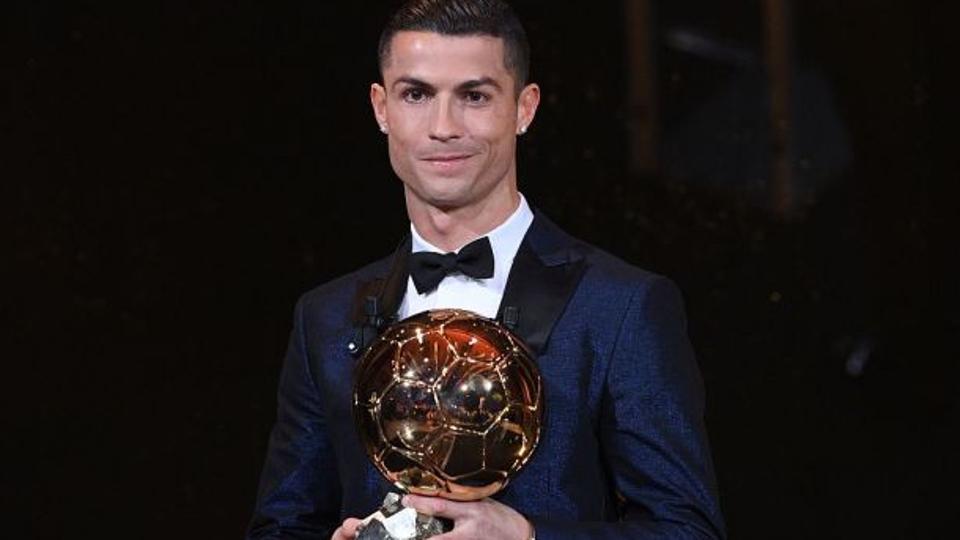• Real Madrid forward presented with award in Paris on Thursday
• Messi finishes second with PSG’s Neymar in third
When the moment arrived, so did he. Cristiano Ronaldo was in Paris to collect the Ballon d’Or at the foot of the Eiffel Tower on Thursday evening, another grand night to go with those he had in Madrid, Málaga and Munich, and in Cardiff especially. Ultimately, those were the moments that marked 2017 and they were his. Which is why this trophy, awarded by France Football, momentarily bought but never truly owned by Fifa, and first awarded to Stanley Matthews in 1956, passed on to Alfredo Di Stéfano the year after, and handed from there to the continent’s best player, season by season, is his too – for a record-equalling fifth time.
Only Lionel Messi has as many. Or should that read: only Ronaldo has as many as Messi? To some of their supporters, the order matters more than it should. The fact that parity has been reached certainly does and it feeds a debate as furious as it is often tedious yet wonderful at heart. Between them, Ronaldo and Messi, Messi and Ronaldo, have not let anyone else win this award for a decade now. This is their era: they have won seven of the past 10 European Cups between them, and been the competition’s top scorer for each and every one of those seasons, and the Ballon d’Or reflects that. In part it is reduced to that, yet it also goes beyond.
Who is the best player? Who has been the best player? Who has had the best season? Who won the most? And, who was the most decisive? They’re not all the same question and it is not always clear which of them, if any, the Ballon d’Or asks, what it is to which each voter lends the greatest weight. Whatever the question actually is, for 10 years the answer has ultimately been Cristiano Ronaldo or Lionel Messi. Cristiano Ronaldo and Lionel Messi, in fact.
At times their dominance can feel like it is partly a product of the grand narrative built around them, the rivalry itself, sometimes forced. There’s an equality that may be a little false too and there is the tyranny of numbers which is sometimes a substitute for actual appreciation, but a seductive one. Voting for them can also feel like the default setting, just what you do. And while some rebel, there may be a lack of imagination. But it is also a reality, a result of the relentlessness of their talent and performance.
Since Kaká won the Ballon d’Or in 2007, there have been others but they have almost always been ‘others’ – the third man on the podium, if they were there at all, and for one night only, gone by the following year: Fernando Torres in 2008, Franck Ribéry in 2013, Manuel Neuer in 2014, Neymar in 2015, Antoine Griezmann in 2016. Xavi – 2009, 2010, 2011 – and Andrés Iniesta in 2010 and 2012 are the only men to have been there more than once, brilliance sustained, while 2010 is the only year since then when Messi and Ronaldo have not both been present.
There have been moments when those ‘others’ might have been more than that, if only for some variety, moments when voters could have broadened their horizon, but even if they’re not going to vote for Messi or Ronaldo in the first place, it takes quite a leap to leave them out entirely. Had Juventus won the European Cup, might Gigi Buffon have won this, the perfect excuse to offer recognition for an entire career? The last decade suggests: no, not even then. That feels almost self-fulfilling; Messi and Ronaldo dominate the debate as well, reducing it to them again. Even in 2010, a unique year in the last ten.
That year, Wesley Sneijder and Arjen Robben were Iker Casillas’s leg away from a firmer candidacy and under the original voting format Sneijder would have won it. Spain won the World Cup, but ‘their’ votes were split among Xavi, Iniesta and Casillas. Messi appeared almost embarrassed to have won it; surprised, certainly. The World Cup used to be a guarantee – remember Fabio Cannavaro in 2006 – but Messi and Ronaldo have even broken that. Somehow, this always seems to come down to those two, to the detriment of others who might deserve more.
Seen from Spain – seen from just about everywhere else, in fact – it is unavoidable. So here we are again, and apologies for slipping into something a little more comfortable when this year perhaps the discussion should take in Gigi Buffon, say. Or what about Luka Modric and Isco? Maybe even Marcelo? Sergio Ramos? After all, you could argue that they were the best players at Real Madrid, league champions and European Cup winners, claiming a double that had evaded them for 59 years.
It won’t have slipped your attention that Real are the team for whom Ronaldo plays. And it is true that for much of the season, a case can be made to suggest they performed significantly better than Ronaldo (although Isco’s brilliance didn’t begin until the spring). It is also true – oh, no, here we go – that for much of the campaign Messi was better than him as well. Not just because it was Messi – although that too – but because Ronaldo was not at his best. So much so that others could also be placed above him, not just the one man who ever is. Quite a few others, in fact.
Ronaldo’s 2016-17 was a curious season. One in which, absurd though it sounds now as he collects this award, the day after he broke yet another record, becoming the first player to score in all six group games in a Champions League campaign, the doubts around him deepened. In which, with Ronaldo 32, it was not so daft – it looks that way now – to ask if this was the beginning of the end. In which he seemed to be changing, some of what made him what he was deserting him. And all the while, Messi was astounding: a long way ahead of everyone else in Spain. And it won’t have slipped your attention either that Spain is the country that Ronaldo plays in. Back to those two again.
Sevilla’s then manager Jorge Sampaoli – who may have his own predilections of course, and who certainly has a passport – saw his team defeated and insisted that they could have beaten Barcelona but they couldn’t defeat the Argentinian magician. “Comparing anyone else to Messi is like comparing a really good cop to Batman,” he said. Yet at the end, it wasn’t Batman who solved the greatest crimes in Gotham city. Not this time. Last season was a campaign in which it wasn’t even the goals that defined Messi but everything else, yet by the end of the domestic season he was still top scorer in the league, the Copa del Rey and the Champions League.
The thing is, that day it was Ronaldo who scored the goal at Málaga that won the title for Madrid – his sixth goal in his final four, decisive, defining games. A week later, he won the European Cup too – and he really had – and Messi was no longer the competition’s top scorer. Ronaldo had come flying past him. He had shown the maturity and intelligence to evolve, even to literally change his shape, his body. He had accepted squad rotation. The quantity of goals ended up mattering far less than the quality of them, their significance, thus destroying one of the more ingrained and absurd criticisms levelled at the dynamic Portuguese forward. He worked with his manager, protecting himself, resting, ready for when it really mattered. And when it did, he responded superbly.
So often defined by the number of goals he scores – something which often did him a disservice – this was Ronaldo’s worst season statistically, which still made it a brilliant one by anyone else’s standards: he had come down from 51, 61, 51, 55, 60, and 53 to only 41. But look at which goals they were. In the spring he accelerated and accelerated and never stopped.
By the end, where seasons are defined and awards are decided, he was simply unstoppable.
Ronaldo reached the quarter-finals of the Champions League with just two goals, nine behind Messi. What was about to happen was barely believable. Ronaldo scored eight in two rounds against Atlético Madrid and Bayern Munich. Yes, eight. And not just any teams, Atlético and Bayern. There were two hat-tricks there. Then he reached the final and scored two more against Juventus, the first and the third – as many as they had conceded in the entire tournament until then.
2017 Ballon d’Or final standings
1 Cristiano Ronaldo (Real Madrid), 2 Lionel Messi (Barcelona), 3 Neymar (Paris Saint-Germain), 4 Gianluigi Buffon (Juventus), 5 Luka Modric (Real Madrid), 6Sergio Ramos (Real Madrid), 7 Kylian Mbappé (Paris Saint-Germain), 8 N’Golo Kanté (Chelsea), 9 Robert Lewandowski (Bayern Munich), 10 Harry Kane (Tottenham Hotspur).
Culled from Here





